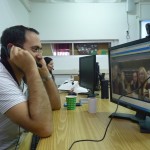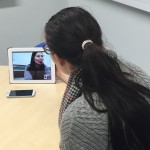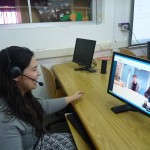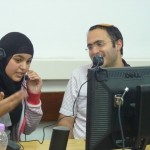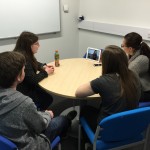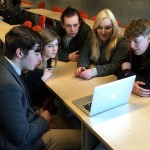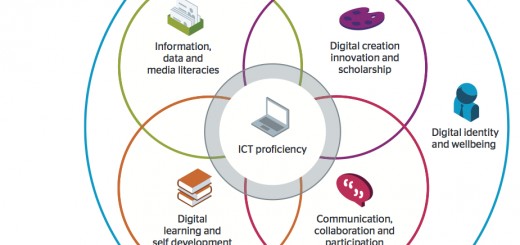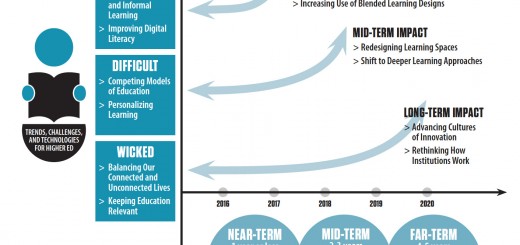Curriculum Internationalisation and Technology Enhanced Learning
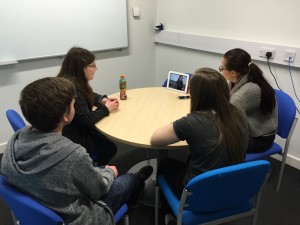 I have recently had the pleasure of working on a collaborative project between the English Department at Kaye College (Israel) and the Theology and Religious Studies Department at York St John University. The project aimed to provide the learners with global perspectives of their discipline by developing an ‘international learning community’ where students are active participants in the teaching and learning process.
I have recently had the pleasure of working on a collaborative project between the English Department at Kaye College (Israel) and the Theology and Religious Studies Department at York St John University. The project aimed to provide the learners with global perspectives of their discipline by developing an ‘international learning community’ where students are active participants in the teaching and learning process.
The collaborative project used York St John’s Universities Learning Management System (LMS) as the platform to support the online activities. The student activities included a series of online asynchronous discussions plus synchronous video-conferences around the topic of Judaism. Students from both institutions were expected to work both independently as well as in international groups, taking advantage of such technology as Skype, Discussion Forums, Google Drive, YouTube, Video editing software. Student expectations were clearly defined at the beginning of the project and were based upon Forbes (2012) Initial Discussion Guidelines.
The structure of the project was designed to provide students with increasing autonomy with respect to their discussions. This took the form of a structured activity initially, in line with first stage (Access and Motivation) on Salmon’s (2011) 5-stage model. This was to ensure that all the learners were comfortable with accessing the project resources, using the technology, and enabled them to introduce themselves to their international peers (Stage 2 – Online Socialisation). The students were asked to share some information about themselves, including a picture/video if possible and to identify two areas of Judaism they were particularly interested in.
A series of asynchronous activities then followed which YSJU students could access as independent learning. The videos incorporated into these activities were created by the students and academics at Kaye College. Students were then divided into small international groups to discuss the first two ‘rites of passage’ birth and Bar/Bat Mitzvah in synchronous online activities. However, this was the only guidance they received, the students themselves had to lead the conversations and decide the areas and questions that were discussed in line with modules learning outcomes (Stages 3 and 4 – Information Exchange and Knowledge Construction). Although, this activity was organised to ensure synchronous communication in the first instance the discussions continued on the LMS for many days with tutors/e-moderators providing feedback were appropriate.
The following week (in the same groups) the student’s communication took the form of a video Skype conversation. Again the topic for discussion was decided in line with the modules learning outcomes and the students were asked to lead the discussions. Many YSJU students used this session as an opportunity to discuss areas of the Jewish culture they were going to focus on in their summative assessment.
A collection of photos and videos from the Skype sessions can be found below:
Impact on the students learning (so far)…
So far the teaching team have noted the following observations:
- Students appreciate the authentic approach to learning about Judaism – it has helped extend and enhance the dialogue and discussion around Jewish culture.
- The project highlighted the diversity within Judaism which included recognition that some Jewish people are culturally Jewish.
- Students appreciate being able to discuss how Judaism is practiced in other parts of the world and it has changed their perspectives of the Jewish culture.
Challenges…
To date the project has successively progressed with any significant challenges. However, a mismatch between the two institutions’ semester dates and the non-proportional split of YSJU students (22) to Kaye College Students (7) prompted the teaching teams at each institution to revise their original approach to some of the activities that were planned.
A word on the technology…
As previously mentioned, several tools and technologies (Skype, Google Drive, YouTube, iPads etc.) have been utilised to enable the collaboration between the students at the two institutions. The confidence in which the students displayed whilst undertaking the online activities so far has been a pleasant surprise to the teaching team. Very little technical support has needed to be provided with many of the students bringing their own devices to interact with their international peers online.
Moving forward…
The final part of the collaboration will culminate in the form of a Skype conference titled ‘Judaism: a way of life or faith?’. The students will then be able to continue the discussion in their groups to address any other areas of Judaism, or additional questions that remain. They will then be able to apply what they have learnt to their summative assignment (Stage 5 – Development). Finally, we will be surveying the students and recording video reflections on how they feel the project has enhanced their learning experience. I’ll feedback more about the impact of the project once we have the data.
Daniel
References
Forbes, D. (2012). Footprints: Participant perspectives informing pedagogy for asynchronous online discussion in initial teacher education. Appendix 15, pp. 259-261. Unpublished EdD thesis, University of Waikato, Hamilton, NZ.
Salmon G. (2011) E-Moderating: The Key to Teaching and Learning Online. 3 ed. Abingdon, Oxon, Routledge.
